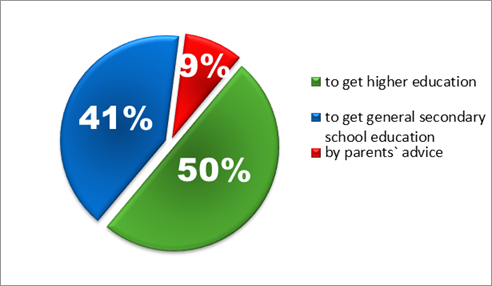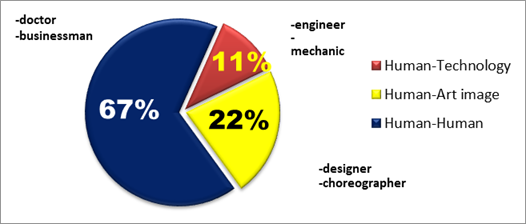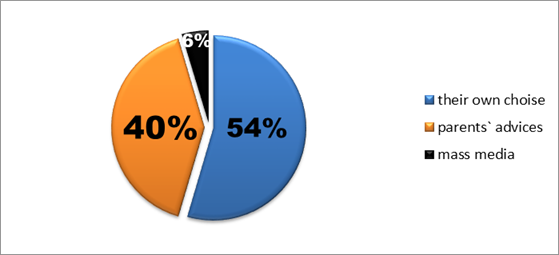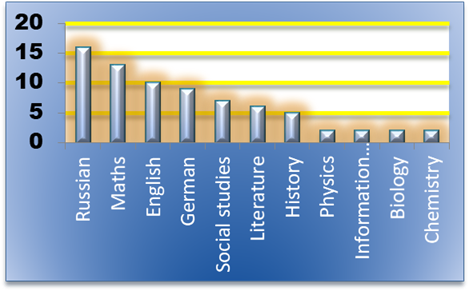Исследовательский проект на английском языке

Holders of the Bachelor degree are admitted to enter the Specialist Diploma and Master’s degree programmes. Access to these programmes is competitive. The Master’s degree is awarded after successful completion of two years' full-time study. Students must carry out a year of research including practice and prepare and defend a thesis which constitutes an original contribution and sit for final… Читать ещё >
Исследовательский проект на английском языке (реферат, курсовая, диплом, контрольная)
Choosing future profession and further education.
Introduction.
Education is important in our life. If you want to get to the top and be successful you must be a well-educated person. An educated person is a person, who knows a lot, can speak foreign languages and use it perfectly. You should be active in social life and at work and, of course, this man has to get higher education.
Higher education is a possibility for getting a good job. In our country, before restructuring the system of education the main principle of teaching was to transfer knowledge to younger generations. Nowadays everything has changed. Students have to practice knowledge in their lives. Employers need specialists who can use their knowledge in work and they as usual apply for a job people who want to improve their abilities.
At the period of choosing a profession, many experts recommend young people to make a triangle whose sides are concepts to «I want», «I can» and «I must.» People will be satisfied only if they manage to combine all these aspects in themselves.
Now we are studying in the tenth class, a year later we are going to enter the Institute. So, this survey is very important for us.
We hope that learning this material will help us to find out ratings of Institutes and professions. And it also helps us to choose further education and future profession.
Theoretical part.
- 1.1. Higher, post-secondary, or third level education refers to the level of education that is provided at academies, universities, colleges, seminaries, institutes of technology, and certain other collegiate-level institutions, such as vocational schools, trade schools, and career colleges, that award academic degrees or professional certifications.
- 1.2. Higher Education in Russia
Higher education is provided by public and non-public (non-State) accredited higher education institutions. There are two levels of higher education:
- · Basic higher education (4 years) leading to the Bachelor’s degree, the first university level degree. This is equivalent to the B.Sc. degree in the US or Western Europe
- · Postgraduate higher education (5−6 years or more). After two years, students are entitled to receive a Master’s Degree (M.Sc, M.A.) in the US or Western Europe. After a Master’s degree, students can continue to study towards a doctoral degree: candidate of sciences degree (the first level, equivalent to Ph.D.) and Doctor of Science degree (the second, highest level, equivalent to Professor).
The Bachelor’s degree programmes last for at least 4 years of full-time university-level study. The programmes are elaborated in accordance with the State Educational Standards which regulate almost 80% of their content. The other 20% are elaborated by the university itself. The programmes include professional and special courses in Science, the Humanities and Social-economic disciplines, professional training, completion of a research paper/project and passing State final exams. Having obtained the Bachelor’s degree, students may apply to enter the Master’s programme or continue their studies in the framework of the Specialist’s Diploma programmes. The Bachelor’s degree is awarded in all fields except Medicine after defending a Diploma project prepared under the guidance of a supervisor and passing the final exams. In Medicine, the first stage lasts for six years.
Holders of the Bachelor degree are admitted to enter the Specialist Diploma and Master’s degree programmes. Access to these programmes is competitive. The Master’s degree is awarded after successful completion of two years' full-time study. Students must carry out a year of research including practice and prepare and defend a thesis which constitutes an original contribution and sit for final examinations.
Access to the candidate of science level is very competitive. Candidates must hold a Specialist Diploma or a Master’s degree. Studies last for 3 years. The graduate school prepares for research and professorial activities. Students must learn teaching methods, ICTs, and pass qualifying exams. They carry out independent research, prepare and defend a dissertation in public. Then they are awarded the scientific degree candidate of sciences. The Doctor of Science programme is specific.
Practical part.
2.1. Tasks and objectives.
In our research we have defined the following objectives:
- 1) Examine the interests of 10-year students, 72 school on the choice of further education and career path
- 2) Make a questionnaire
- 3) Interrogate students
- 4) Analyze the results
- 5) Make conclusions
- 2.2. Methods of investigation
The main method of research is questioning students. It helps us quickly collect and get information about students' educational interests.
The questionnaire is consisted of 10 questions:
- 1. Why did you choose learning in 10 class?
- 2. Do you plan to get higher education?
- 3. Do you know what Institute or University would you like to study at?
- 4. Have you already chosen your future profession?
- 5. Who do you want to be in the future?
- 6. Who helped you to choose the profession?
- 7. What subjects do you consider the most important? Why?
- 8. Are you planning to attend training courses next school year?
- 9. Do your parents influence on your choice?
- 10. What is higher education for you?
- 2.3. Description of results.
- 22 students of 10 class were interrogated. Their average age of applicants was 16 years old. When we were analyzing their answers, we decided that a half of students chose studying at the upper secondary school with a view of further studying at university or institute. Only 9% of students came to the 10th class `cause of their parents' advice. And unfortunately a large part of the ten-formers (40%) did not decide what are they going to be after school. Diagram number 1 shows you reasons for entering the 10th grade.

Diagram 1 «Reasons for entering the 10th form, school 72».
According to the following answers the most respondents (95%) explain the choice of higher education with a chance to achieve high results in their future career. Only 50% were focused on 10th class as a compulsory stage of entering institute. One student considers that higher education is not necessary in the life. 59% of respondents determine university.
About 70% have already chosen the sphere of professional interests and know what profession they would like to learn. 32% students have not chosen their future profession. The second diagram number shows the differences of professional interests of children. 68% of young girls and boys prefer profession connected to communication with people. The leading place occupies professions of system «human-human». Next in popularity was the sphere of culture and art (22%). The smallest number of students (11%) sees their career in technical direction.

Diagram 2 «Differences in occupational preferences» .
When we analyzed students' answers about their professional interests, we have identified the types of their professions. 54% students of tenth class determine future profession independently. Only to 40% of our responds parents helped to choose future profession. To 6% of 10-formers a great influence made Mass media.

Diagram 3 «What factors has influenced on the pupils` profession choice?».
Rating of subjects is presented in Graph № 1.
- 35% students believe the most important subject is Russian language.
- 27% students believe the most important subjects are Computer Science, Algebra, Physics.
- 22% students believe the most important subjects are foreign languages.
- 16% students believe the most important subjects are Social studies and History.
Graph № 1.
«Rating of school subjects».

Diagram 4.
- 95% students are planning to attend training courses next school year.
- 35% students are not planning to attend training courses next school year.
Parents influence to the choice the further education of 73% students. To the question «What does higher education mean for you?» students gave different answers such as:
- -it is a diploma which gives me the right to apply for a well-paid work
- -it is the future of all my life
- -it is a respectable work
- -it is a good foundation and great potential
- -it is a success
- -prestigious profession
- -key to a bright future
- -a nice profession with a good income
Conclusion.
Summarizing our research, I can note the following:
- 1. Students of 10th class want to get higher education
- 1. Next year almost all of them are planning to attend special courses for being extra prepared for studying in Institutes.
- 2. About 60% of pupils know where they are going to study and what education they want to get.
- 3. Not all the pupils had already chosen their future profession. Those who had already decided their future had made this decision themselves or their parents helped them.
- 4. 70% of boys and girls are going to work with people («human-human» system).